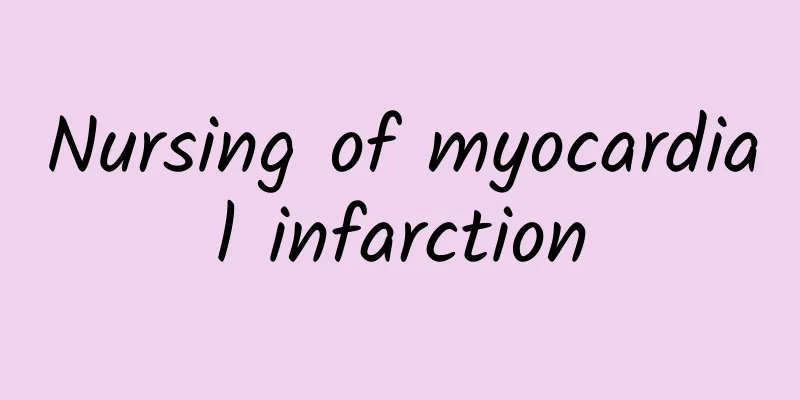Nursing of myocardial infarction

|
According to unofficial surveys, hundreds of thousands of people in my country suffer from myocardial infarction every year. In addition, the incidence of the disease has shown a clear upward trend in recent years, with approximately 500,000 new patients each year. Therefore, myocardial infarction is indeed one of the most harmful diseases, so as family members and friends of the patient, you must understand clearly what the care for myocardial infarction is like. In fact, the nursing methods for myocardial infarction are not complicated. First of all, as the patient's family and friends, you should communicate and interact more with the patients, and give them encouragement and confidence, etc. This can relieve and control the patient's emotions. In addition, you should also pay attention to diet and rest, etc. Below I will give you a detailed introduction to the care of myocardial infarction. Nursing of myocardial infarction 1. Psychological treatment: Patients should keep themselves comfortable and happy mentally at ordinary times, eliminate tension and fear, pay attention to controlling their emotions and not get excited. And avoid overwork and catching colds. Because these factors can induce angina pectoris and myocardial infarction. 2. Absolute bed rest is required during the acute phase: enhanced care should be provided during bed rest. Assistance should be provided with eating, washing, urination and defecation to avoid increasing the patient's workload. Later, the amount of activity can be gradually increased according to the condition of the disease. The rest environment should be quiet, comfortable, clean and have appropriate room temperature. 3. Avoid limb thrombosis and constipation: Patients who have been bedridden for a long time should perform passive limb movements regularly to avoid limb thrombosis. Constipation can easily occur due to bed rest, changes in environment and bowel movement. Patients should be reminded not to exert excessive force when defecating, as forceful defecation can increase the burden on the heart, aggravate myocardial hypoxia and endanger life. They can be given laxatives or enema to facilitate bowel movements, and oral nitroglycerin tablets or isopropylamine can be given before defecation. 4. The diet should be light: Eat foods that are easy to digest, produce less gas, and contain an appropriate amount of vitamins, such as vegetables, fruits, and soy products. Maintain the necessary calories and nutrition every day, eat small meals frequently, avoid increasing the burden on the heart due to overeating, and avoid smoking and drinking. Eat less foods high in cholesterol. 5. Once angina pectoris and myocardial infarction occur, first let the patient lie down or sit quietly to rest, do not walk around, and do not move the patient in a hurry. The patient's pulse should be observed to be regular. If there is cold sweat, pale complexion, and increased irritability, the patient should be comforted and calmed. Then you can ask the nearest doctor to come for a visit, and after the initial treatment is stable, transfer the patient to the hospital for treatment. 6. Be alert to atypical manifestations of the disease: Sometimes the symptoms of angina pectoris or myocardial infarction are very atypical. For example, some patients may experience reflex toothache, and some myocardial infarction may precede stomach pain. When encountering this situation, you must be vigilant. Patients with a history of coronary heart disease should not be ignored and should seek medical treatment as soon as possible. Everyone already knows something about the care for myocardial infarction. In fact, as the patient's family, we must make sure that the patient pays attention to dietary issues. In addition to eating more easily digestible foods that produce less gas, they should also eat small meals frequently, etc., so as to avoid increasing the burden on the heart. In addition, you should also avoid excessive force during defecation, which may cause myocardial hypoxia or even life-threatening conditions. In addition, if the patient feels unwell, he or she should be sent to the hospital for medical treatment in time, because early treatment can better control the disease. |
>>: What to do if you have continuous hiccups
Recommend
Can I wear contact lenses if I have trachoma?
Trachoma is a relatively common eye disease, espe...
Where does labor pain hurt?
After a long period of pregnancy, pregnant women ...
What is the reason for the black and purple toenail?
If you find black and purple inside your toenails...
Effects of fennel
Fennel is a common vegetable in our lives. Its un...
What to do if your two-year-old baby has urticaria
Children under three years old have the worst res...
What are the effects of pinching the belly button during pregnancy?
The belly button is the softest part of our body....
Does falling asleep help reduce fever?
When children have a cold or fever, many parents ...
How to treat scabies nodules
Scabies nodules are mainly caused by some hard bu...
How to control desire
Desire is a double-edged sword. If used well, it ...
What foods are effective in removing bad breath?
Bad breath is mainly manifested in bad smell in t...
Left chest pain
How many people will have chest problems in life?...
Rhinitis causes itchy eyes, prompt treatment is the key
Rhinitis is indeed a very torturous disease. It n...
What is ground-glass opacity in the lungs?
Once nodules appear in the human lungs, ground-gl...
What are the functions and effects of Sichuan Achyranthes bidentata?
Sichuan Achyranthes has many functions and effect...
What should I do if I have chronic pharyngitis during pregnancy?
Spring is the season when pharyngitis is prone to...









